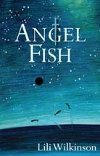Angel fish by Lili Wilkinson

Black Dog Books, 2009. ISBN 9781742030463.
(Age 10+) Highly recommended. What a talented writer Lili Wilkinson is!
Not only does she write engrossing teenage fiction, but her historical
fiction is outstanding. Angel fish is based on the Children's Crusade
and follows the story of Gabriel a poverty stricken boy who lives in
the French village of Machery. Inspired by Stephan, a boy who made his
head whirl 'round and round with strange thoughts', and who is raising
a Children's Army to defeat the Saracens in the Holy Land, Gabriel
follows him on their desperate march across the Alps to Genoa and onto
the shores of the ocean. Ten thousand children are gathered on
the way and this the story of their tragic march.
Told in the first person narrative by Gabriel, this is a story that
will appeal to both children and adults. In short sentences, Gabriel
recounts what it is like to follow a charismatic leader. He describes
the trials of a prolonged march and I suffered agonies as I read about
the death of countless children as they crossed the freezing Alps. The
descriptions of blind faith and the children's belief that Stephan can
perform a miracle and part the waters of the ocean so that they can get
to the Holy Land are engrossing and difficult to understand in a
secular time. The betrayal of the children by William the Iron and Hugh
the Pig is devastating.
Wilkinson explores the meaning of leadership as Gabriel comments on
Stephan's actions, his self delusion and the conduct of Niklaus who has
also led children to Genoa. Gabriel's faith in Stephan never wavers
even though the reader sees his inconsistencies through the eyes of a
young girl Ines and Fox-boy, who become Gabriel's close friends.
With its themes of charismatic leadership, friendship and religious
beliefs, its beautiful language and touching story, this is a must for
the library and would also be a good choice as a novel for class or
literature circles. There is a thought provoking Author's note at the
end of the book, giving details about history being 'a strange thing'.
A bibliography also points to reading for those who want to find out
more about the period.
Pat Pledger